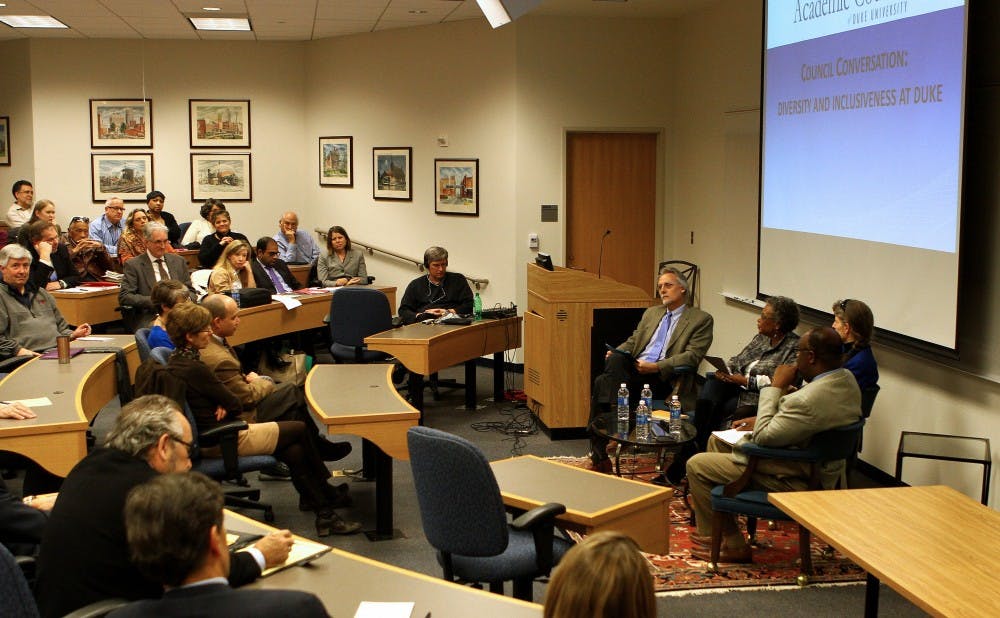Faculty called for an administration plan to improve campus diversity at the Academic Council meeting Thursday.
Council Chair Joshua Socolar, professor of physics, led the conversation and invited four guests to discuss the topic—Karla Holloway, James B. Duke professor of English and professor of law and women's studies; Bill Boulding, dean of the Fuqua School of Business; Jennifer West, Fitzpatrick Family University professor of engineering; and Kerry Haynie, associate professor of political science and African and African American studies. Socolar noted the conversation's goal was to create a vision statement to guide routine practices and the development of strategic initiatives targeting campus diversity.
“The diversity of our community and our inclusive culture determine our ability to excel,” Socolar said.
Socolar added that the council has had a history of developing diversity reforms. Twenty-five years ago, the council resolved to support a five-year initiative spearheaded by Provost Peter Lange to increase the number of black faculty, which was then passed for another 10 years. A second program, entitled the Faculty Diversity Initiative was launched 10 years ago following two reports by faculty task forces focusing on the hiring and retention of women and underrepresented minorities.
“The completion of the Faculty Diversity Initiative and the imminent transition of the provost's office make this a particularly good time for the faculty to take ownership of the continuing process,” Socolar said.
Holloway proposed that the Academic Council develop a strategic plan centered on issues around underrepresented minorities in faculty.
“I don’t think that administrators exercise full authority that they might when it comes to matters of diversity,” Holloway said. “It’s hard when you talk about race. It’s even easier these days to talk about changes in health care policies, arguably even Kunshan, than to talk about the lingering issues in structural attention to underrepresented minorities.”
She noted that University policies regarding faculty diversity have always come from the administration to the faculty.
“There is somebody who tells us that there is a new policy and we get busy trying to accommodate it,” Holloway said. “We need our freedom, and it’s time for the Academic Council to ask administration to let departments loose.”
She added that departments should be given the chance to take advantage of faculty intelligence in seeking out the most qualified candidates.
“It’s time for the leadership to come from the faculty,” Holloway said. “Underrepresented minorities drift away easily, and let’s call them back to the center.”
Boulding noted the importance of "collective diversity," a concept introduced by a team of Fuqua students. He highlighted the importance of a group of people from diverse backgrounds collaborating and supporting each other's ambitions.
“The highest quality and most creative ideas come from diversity, but if you simply throw together diverse people, it is unlikely that you will get good results,” Boulding said. “Those things only emerge when you have a culture of respect for all people in your community and of a sense of shared identity.”
He added that some peer institutions have missed fundamental points in creating a truly diverse environment. He cited a New York Times article last October which reported that the Harvard Business School was facing issues around gender diversity and socio-economic diversity.
“The Harvard example is a great example of just throwing people together without thinking about the underlying culture that allows people to work together in an effective way," Boulding said.
West highlighted the importance of improving the campus climate through campus leadership, clarifying core values and providing training for search committees on topics such as implicit bias against women.
She noted that low numbers of representative faculty often result in a sense of isolation for underrepresented groups.
“We want to make sure that people feel they are in a place where they are not profoundly isolated, and where students can feel they have an array of potential role models and mentors,” West said.
Socolar concluded that the council should continue discussing diversity and possibly establish a committee to develop a plan for improving campus inclusiveness.
In other business
At the beginning of the meeting, Socolar paid tribute to Benjamin Ward, professor of philosophy who passed away last month after a three-year battle with colon cancer.
“He was a devoted member of our faculty, whose passion for academic life and faculty-student interaction, along with his prodigious musical talents, have inspired so many students and faculty," Socolar said. "We will miss Ben."
The memorial service for Ward will be held Saturday at 3 p.m.
Get The Chronicle straight to your inbox
Signup for our weekly newsletter. Cancel at any time.

